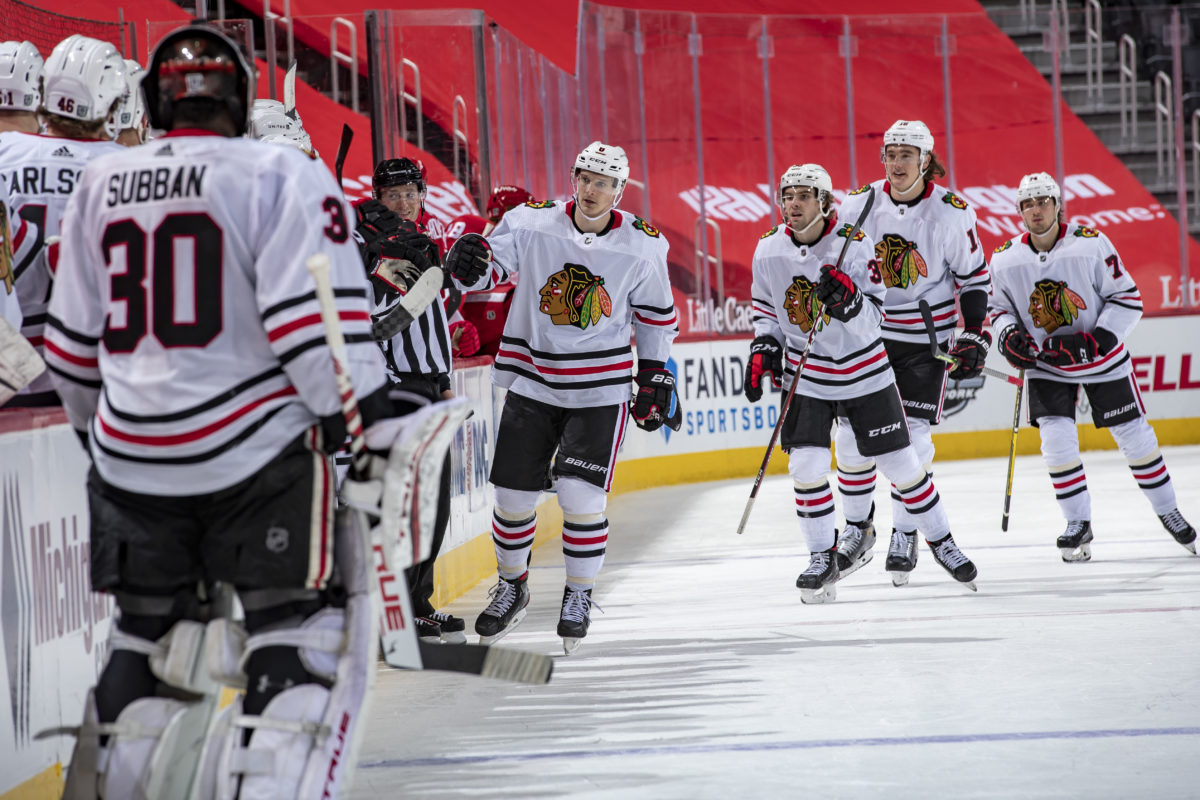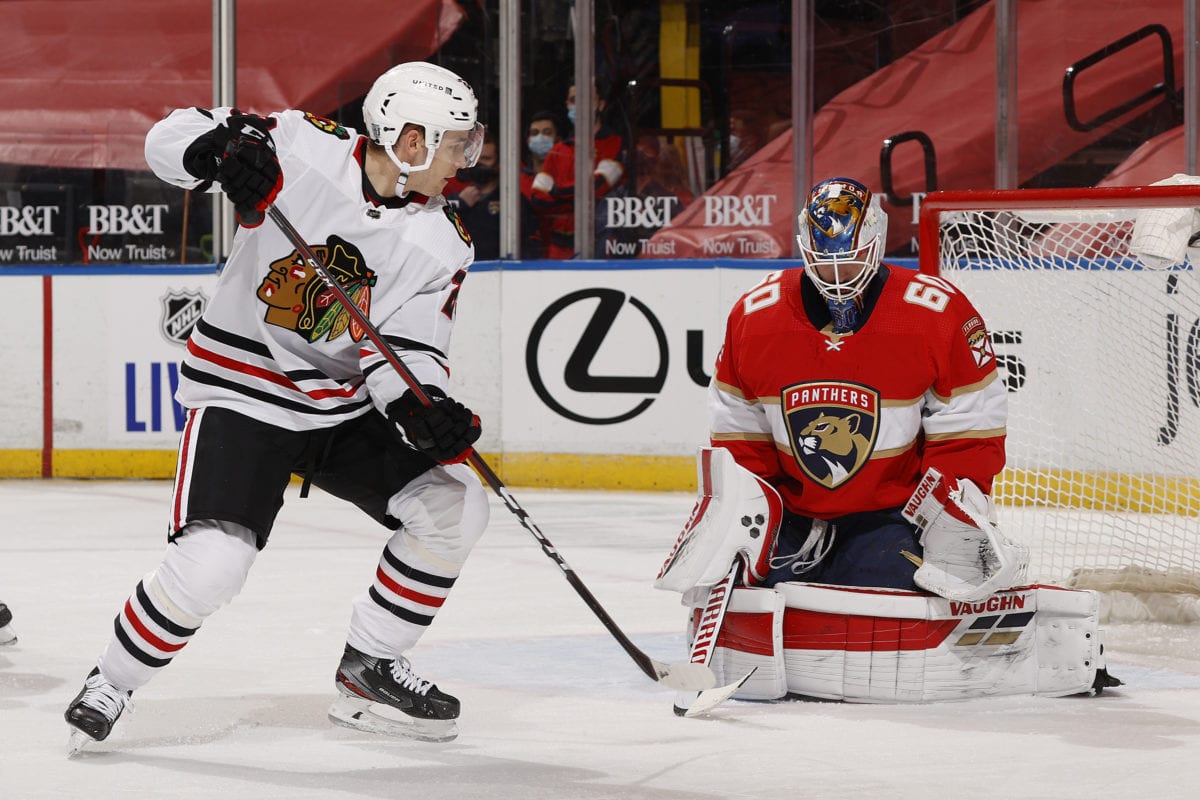When the Chicago Blackhawks look back on the 2020-21 season, they’ll be left wondering what could have been if they had successfully leveraged that impressive start to their rebuild. Whereas, now, they only have themselves to blame for failing to push it even further along.
Chicago started this year’s story strategically, by setting expectations well below the franchise’s standard of success. A slow start was anticipated, but their follow-up was not. They worked their way into what seemed to be a playoff-bound position, thanks, mostly, to overachieving in a number of key categories. Nevertheless, they were there.

Reflecting on their campaign’s various narratives, it’s impossible to ignore one that foreshadowed an unhappy ending for this team all along. Despite an impressive rookie class, effective veteran leadership, necessary rebound performances, and upsets throughout, Chicago’s inability to hold a lead overshadowed it all in one fell swoop.
Alleviating the Obvious Excuse
In most cases, a rebuild justifies failure. Had the Blackhawks maintained an uncompetitive pace, such logic would stand. However, they earned far too much success at points throughout the year to rationalize avoidably poor efforts.
While it might seem that a redeveloping system would struggle to gain a lead in the first place, that area of Chicago’s game plan wasn’t the problem. Instead, the Blackhawks battled alongside their Discover Central Division rivals and were right in the conversation for who would finish within the top four.
Unfortunately, a joy ride can only last as long as it’s being fuelled. In too many examples throughout 2020-21, the Blackhawks managed to take a strong start and whittle it away. In fact, had they held on to win every game in which they held any sort of lead, a postseason appearance would have been a lock.
Robust Rebuilding Roster
One might look to their mostly underdeveloped roster as a reason why managing leads against grown men would have been a difficult feat. However, a veteran cast of Patrick Kane (32), Duncan Keith (37), Ryan Carpenter (30), Calvin de Haan (30), Carl Söderberg (35), Connor Murphy (27), and Mattias Janmark (28) provided a presence that should have been able to better compensate.
It’s not like the Blackhawks lack talent in those who haven’t been around as long, either, including, but certainly not limited to, Kevin Lankinen (26), Alex DeBrincat (23), Dominik Kubalik (25), Pius Suter (24), Kirby Dach (20), Brandon Hagel (22), Adam Boqvist (20), and Philipp Kurashev (21). All are already stars, with years ahead of them to elevate.

Blaming their construction feels like a cop-out. Of course, a rebuilding squad won’t see the levels of success that a more established lineup should expect. Yet, if the former is already showing that they are capable of competing, then it’s on them to finish every job they start.
A Season-Long Struggle
Reviewing Chicago’s collective results through 2020-21, noting the ups and downs throughout, it’s interesting to dissect what worked when it was going well and what faltered when they failed. There are generally correlating factors, like special teams’ success or lack thereof, throughout each such stretch.
However, when it comes to this team’s inability to hold a lead, that was a problem that plagued them all season long and in every capacity. Each of their seven division rivals enjoyed at least one comeback win against Chicago this year.
Which only furthers the narrative at hand. They can’t blame an isolated rough patch for bloating these stats, as failing to close out games was a year-long issue.
Fittingly, the Blackhawks even found a way to cap off their 2020-21 campaign in this very manner. They began their final game of the season, against the Dallas Stars, up with a 2-0 lead only a few minutes into the first. The contest ended, though, with Chicago on the wrong side of a 5-4 overtime loss.
If that isn’t a microcosm of this very topic, I don’t know what is.
Crunching the Negative Numbers
In most other cases, a near .500 points percentage would suggest at least some level of unexpected success for a lineup that was positioned to achieve less. The same can be said of this year’s Blackhawks, who broke certain rebuild barriers with a record of 24-25-7 throughout 2020-21.
However, instead of remaining content in a job well done, the Blackhawks should be at least somewhat frustrated with their inability to accomplish more when it laid right there in front of them for the taking.
Looking specifically at the losses they accumulated after having held any sort of a lead throughout those respective games, the Blackhawks watched 12 potential victories fade away. Those matches injected 0-7-5 into their record, adding only 5 points when 24 were up for grabs.
Chicago could have ended the year 36-18-2. That would have both secured a postseason berth and seen them protect a top spot in the Central. Instead, they ended the season 24-25-7, forced to fill out fantasy playoff brackets that include 16 clubs from cities other than their own.
Had They Kept Every Lead
With the unique nature of only inter-divisional play throughout this season, every team’s individual outcomes also had a direct impact on those that surrounded them.
Simply stated, a Blackhawks loss meant more than just missed points. It also included an added buffer through the standings for the victorious side. Those ahead got to rise even higher, while any who were chasing got that much closer. Shuffling was aplenty throughout the standings this year.
Basically, the rest of the division profited off of Chicago’s losses. This becomes much more apparent when you consider how the standings ultimately panned out.
2020-21 Discover Central Standings
| Place | Team | Points |
| 1 | Carolina Hurricanes | 80 |
| 2 | Florida Panthers | 79 |
| 3 | Tampa Bay Lightning | 75 |
| 4 | Nashville Predators | 64 |
| 5 | Dallas Stars | 60 |
| 6 | Chicago Blackhawks | 55 |
| 7 | Detroit Red Wings | 48 |
| 8 | Columbus Blue Jackets | 48 |
Whereas, if you tally up all the games that Chicago let slip away and revise the math as though each ended in victory, the implications throughout the standings are quite drastic. Particularly, for the Blackhawks.
The calculations below assume that each respective contest still experienced the same dynamics, including when extra time was necessary to break a tie. However, in these hypothetical instances, the Blackhawks earned both available points with each overtime while their opponents were limited to only the one per for making it there.
Recalculated Divisional Standings
| Place | Team | Points |
| 1 | Carolina Hurricanes | 78 |
| 2 | Florida Panthers | 75 |
| 3 | Chicago Blackhawks | 74 |
| 4 | Tampa Bay Lightning | 71 |
| 5 | Nashville Predators | 63 |
| 6 | Dallas Stars | 59 |
| 7 | Detroit Red Wings | 46 |
| 8 | Columbus Blue Jackets | 46 |
While one can make an argument that even the best teams let leads slip away from time to time, the reality is that they don’t make it a pattern. Let alone one that ultimately decides the fate of their entire year’s worth of work.
Although in-game score fluctuations are a byproduct of the league’s parity, letting that many contests end up in a loss is not the type of norm that precedes higher levels of success. Chicago is living proof of that.
Time to Look Ahead Instead
As the 2021 Stanley Cup playoffs get underway, the Blackhawks will have already entered their offseason. Not because they weren’t able to compete, but as a result of their inability to close out too many games they were actually winning in the first place.
While rationalizations are aplenty for how or why this may have happened, the reality is that a team capable of capturing a lead should be held accountable when they set it free. Despite the Blackhawks’ level of inexperience, alongside their obvious areas of improvement, they are still at fault for failing to secure those points.
Had the Blackhawks effectively held on every time they pushed ahead through those respective matchups, this entire story would have taken a different shape. Yet, Chicago’s reality remains.
Back to the rebuilding drawing board, in hopes of not only embracing more unexpected success next year but also seeing it hold up as a worthwhile achievement by season’s end.
Stay in the know as we debate and discuss all things Blackhawks on our weekly show, Blackhawks Banter. Subscribe to our YouTube Channel, like our Facebook Page, and follow us on Twitter to catch every new episode.